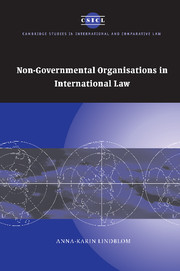Book contents
- Frontmatter
- Contents
- Acknowledgements
- List of abbreviations
- Part I Theoretical framework
- Part II Legal and empirical survey
- 4 Rights and obligations
- 5 Standing before international judicial and quasi-judicial bodies
- 6 Non-party participation before judicial and quasi-judicial bodies
- 7 Co-operation with intergovernmental organisations
- 8 Participation in international conferences
- 9 Agreements with states and intergovernmental organisations
- Part III Conclusion
- Bibliography
- Interviews
- Index
- CAMBRIDGE STUDIES IN INTERNATIONAL AND COMPARATIVE LAW
7 - Co-operation with intergovernmental organisations
Published online by Cambridge University Press: 12 August 2009
- Frontmatter
- Contents
- Acknowledgements
- List of abbreviations
- Part I Theoretical framework
- Part II Legal and empirical survey
- 4 Rights and obligations
- 5 Standing before international judicial and quasi-judicial bodies
- 6 Non-party participation before judicial and quasi-judicial bodies
- 7 Co-operation with intergovernmental organisations
- 8 Participation in international conferences
- 9 Agreements with states and intergovernmental organisations
- Part III Conclusion
- Bibliography
- Interviews
- Index
- CAMBRIDGE STUDIES IN INTERNATIONAL AND COMPARATIVE LAW
Summary
Introduction
IGOs are themain fora for international law- and policy-making. With very few exceptions, full membership in these fora is open exclusively to states, and non-members may not vote. NGOs and other non-state actors are therefore excluded from the actual decision-making within most IGOs. However, many IGOs grant some form of observer status to states that are not members, other IGOs, liberation movements, NGOs and other entities. Schermers and Blokker note that ‘The word “observer” might give the impression that these entities with observer status have a passive role. However, the opposite is often true. Observers often participate actively, transmitting their ideas to international organisations.’
The relations between IGOs and NGOs are of interest in a study on the international legal status of NGOs for two main reasons. First, consultative status or other forms of institutionalised co-operation implies some form of recognition of NGOs as partners in the international legal system. Secondly, the instruments and practices which regulate such co-operation constitute platforms which can be used by NGOs for influencing decision-making and the gradual development of international law which occurs within intergovernmental fora.
As will be shown below, NGOs engage in institutionalised co-operation with IGOs to an increasing extent, and appear to have some influence on their decision-making processes. In order to evaluate this co-operation and its meaning in legal terms, the formal relations between different IGOs and NGOs will be surveyed.
- Type
- Chapter
- Information
- Non-Governmental Organisations in International Law , pp. 366 - 445Publisher: Cambridge University PressPrint publication year: 2006

